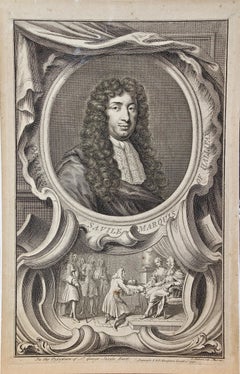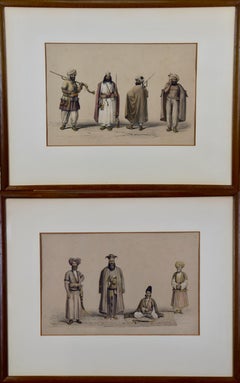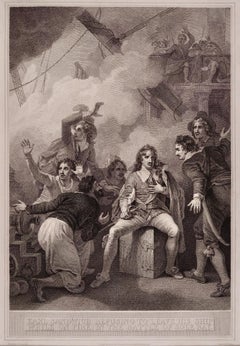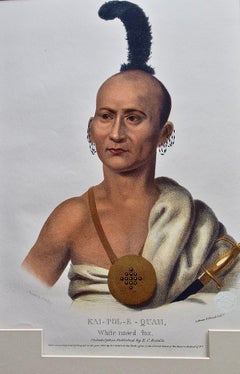Want more images or videos?
Request additional images or videos from the seller
1 of 11
Joseph DuplessisBenjamin Franklin: A Framed 18th Century Portrait of by Duplessis1788
1788
Price:$1,479
$2,175List Price
About the Item
About the Seller
5.0
Platinum Seller
Premium sellers with a 4.7+ rating and 24-hour response times
Established in 2011
1stDibs seller since 2019
293 sales on 1stDibs
Typical response time: 1 hour
Authenticity Guarantee
In the unlikely event there’s an issue with an item’s authenticity, contact us within 1 year for a full refund. DetailsMoney-Back Guarantee
If your item is not as described, is damaged in transit, or does not arrive, contact us within 7 days for a full refund. Details24-Hour Cancellation
You have a 24-hour grace period in which to reconsider your purchase, with no questions asked.Vetted Professional Sellers
Our world-class sellers must adhere to strict standards for service and quality, maintaining the integrity of our listings.Price-Match Guarantee
If you find that a seller listed the same item for a lower price elsewhere, we’ll match it.Trusted Global Delivery
Our best-in-class carrier network provides specialized shipping options worldwide, including custom delivery.You May Also Like
Untitled (Portrait)
By William H. Bailey
Located in Fairlawn, OH
Untitled (Portrait)
Drypoint printed in blue-black graphite mixed with silver, 1974
Signed and dated lower ight (see photo)
From: Series entitled Six Drypoints
Edition: 23 (4/23)
Numbered lower left (see photo)
Print Shop: Crown Point Press
Printer: Jeannie Fine
Publisher: Parasol Press, New York
Note: A portfolio is in the collection of the National Gallery, Australia, Fine Arts Museums of San Francisco- de Young/Legion of Honor, Davis Museum at Wellesley College and the Yale University Art Gallery.
Condition: Excellent
Image/Plate size: 6 3/8 x 5 3/8 inches
Sheet size: 24 x 20 inches
From a portfolio of six drypoints, printed with unqiue combination of blue-black graphite shavings combined with silver to create the appearence of an original drawing. I know of no other artist to use a similar printing technique.
William Bailey studied art at the University of Kansas, Yale University and Yale School of Art where he studied with Josef Albers receiving his MFA in 1957.
Mr. Bailey’s first exhibition in New York was at Robert Schoelkopf Gallery in 1968, where he showed regularly until its closing in 1990. During the 90’s he exhibited at the Andre Emmerich Gallery and on its closing, exhibited at the Robert Miller Gallery. In 2004 Bailey moved to the Betty Cuningham Gallery where his most recent exhibition was held from April 30 - June 11, 2016.
Mr. Bailey’s work has been exhibited extensively in both America and Europe. He is represented in the collections of The Whitney Museum of American Art, The Museum of Modern Art, the Pennsylvania Academy of Fine Arts, and the Hirschhorn Museum and Sculpture Garden, among others. He was awarded a Guggenheim Fellowship in painting in 1965. Mr. Bailey was elected to The National Academy of Design in 1983 and to The American Academy of Arts and Letters in 1986.
Mr. Bailey taught at The Yale School of Art from 1958 to 1962 and from 1969 to 1995. He has also taught at The Cooper Union, University of Pennsylvania and Indiana University. He maintains studios in New Haven and in Umbertide, Italy.
Courtesy Betty Cunningham Gallery
Tribute to William Bailey
THE NEW YORK TIMES
William Bailey, whose pristine, idealized still lifes and female nudes made him one of the leading figures in the return of figurative art in the 1980s, died on April 13 at his home in Branford, Conn. He was 89.
His death was confirmed by his daughter, Alix Bailey.
Beyond his painting, Mr. Bailey influenced generations of students in his many years as a teacher at the Yale School of Art.
In some of his best-known work, Mr. Bailey arranged simple objects — the eggs, bowls, bottles and vases that he once called “my repertory company” — along a severe horizontal shelf, or on a plain table, swathing them in a breathless, deceptively serene atmosphere heavy with mystery.
William Bailey, Modernist Figurative Painter, Dies at 89
He swathed his nudes and still lifes of eggs, vases, bottles and bowls in a breathless, deceptively serene atmosphere heavy with mystery.
The painter William Bailey in 2009. He was never given a career survey in a major museum, but his influence, particulary on students at Yale, was deep.
Ford Bailey
By William Grimes for the New York Times
April 18, 2020
William Bailey, whose pristine, idealized still lifes and female nudes made him one of the leading figures in the return of figurative art in the 1980s, died on April 13 at his home in Branford, Conn. He was 89.
His death was confirmed by his daughter, Alix Bailey.
Beyond his painting, Mr. Bailey influenced generations of students in his many years as a teacher at the Yale School of Art.
In some of his best-known work, Mr. Bailey arranged simple objects — the eggs, bowls, bottles and vases that he once called “my repertory company” — along a severe horizontal shelf, or on a plain table, swathing them in a breathless, deceptively serene atmosphere heavy with mystery.
His muted ochres, grays and powdery blues conjured up a still, timeless world inhabited by Platonic forms, recognizable but uncanny, in part because he painted from imagination rather than life.
“They are at once vividly real and objects in dream, and it is the poetry of this double life that elevates all this humble crockery to the realm of pictorial romance,” Hilton Kramer wrote in The New York Times in 1979.
Mr. Bailey’s female figures, some clothed in a simple shift or robe and others partly or entirely nude, are disconcertingly impassive, implacable and unreadable, fleshly presences breathing an otherworldly air.
The critic Mark Stevens, writing in Newsweek in 1982, credited Mr. Bailey with helping to “restore representational art to a position of consequence in modern painting.”
But his version of representation was entirely idiosyncratic, seemingly traditional but in fact “a modernism so contrarian,” the artist Alexi Worth wrote in a catalog essay for the
William Harrison Bailey...
Category
1970s Realist Portrait Prints
Materials
Drypoint
Self Portrait by Jim Dine (plate seven from Self Portraits portfolio 1971)
By Jim Dine
Located in New York, NY
Jim Dine, Self Portrait 1971
drypoint on Hodgkinson Hand Made Tone-Weave paper
Paper 18 x 14 in. / 46 x 36 cm
Plate 8 x 6 in. / 20 x 15 cm
plate seven from Self Portraits (1971) port...
Category
1970s Realist Portrait Prints
Materials
Etching, Drypoint
$1,500
H 20.5 in W 15.5 in
Similitudes
By Jean-Louis Forain
Located in New York, NY
Jean- Louis Forain (1852-1931), Similitudes, etching and drypoint, not signed [signed in the plate upper right], 1880, from the total edition of 545, on wove paper, in generally good...
Category
1880s Realist Portrait Prints
Materials
Drypoint
A Man of Mangea 1784 final voyage of Captain Cook by John Webber
By John Webber
Located in Paonia, CO
A Man of Mangea is from the 1784 First Edition Atlas Accompanying Capt. James Cook and King; Third and Final Voyage of Captain James Cook. John Webber (1752-1793) was the official a...
Category
1780s Realist Portrait Prints
Materials
Engraving
$800
H 22 in W 16.5 in
A Young Woman of Otaheite, Dancing (Tahiti) 1784 Captain Cooks Voyage by Webber
By John Webber
Located in Paonia, CO
A Young Woman of Taheite Dancing (Tahiti) is from the 1784 First Edition Atlas Accompanying Capt. James Cook and King; Third and Final Voyage of Captain James Cook.John Webber (1752-...
Category
1780s Realist Figurative Prints
Materials
Engraving
A Man of Kamtschatka (Russia) 1784 Captain Cooks Final voyage by John Webber
By John Webber
Located in Paonia, CO
A Man of Kamtschatka (Russia) is from the 1784 First Edition Atlas Accompanying Capt. James Cook and King; Third and Final Voyage of Captain James Cook. John Webber (1752-1793) was t...
Category
1780s Realist Figurative Prints
Materials
Engraving
A Man of the Sandwich Islands, Dancing (Hawaii) from Captain Cooks travels engra
By John Webber
Located in Paonia, CO
A Man of the Sandwich Islands Dancing (Hawaii) is from the 1784 First Edition Atlas Accompanying Capt. James Cook and King; Third and Final Voyage of Captain James Cook. John Webber (1752-1793) was the official artist for the third voyage of Captain James Cook (1728-1779). The purpose of this voyage was to discover the Northwest Passage and to explore the Pacific Ocean north of the Equator. These engravings were published in 1784-85 by G. Nichol and Thomas Cadell of London in the four large format atlas, Voyage to the Pacific Ocean. Captain Cook was an extraordinary explorer known for discovering and mapping unknown territory and for his many contributions to the scientific world. These original engravings from Webber’s drawings and paintings are only a glimpse into this great man’s historical contributions that make him one of the greatest explorers of all times.
This image shows a Hawaiian dancer...
Category
1780s Realist Figurative Prints
Materials
Engraving
Judy
By Beth van Hoesen
Located in West Hollywood, CA
A magnificent original lithograph by American artist Beth van Hoesen.
Noted as a master printmaker, van Hoesen exhibited at the de Young Memorial Museum, San Francisco; Achenbach ...
Category
1970s Realist Figurative Prints
Materials
Lithograph
Desnudo de espalda
By Francisco Zúñiga
Located in New York, NY
Brown and black chalks and pencil on cream wove paper. Signed and dated in pencil, lower left recto.
Category
1960s Realist Figurative Drawings and Watercolors
Materials
Chalk, Pencil
Cap'n A.B Dick (A) gray fisherman portrait sou'wester hat R.B. Kitaj lithograph
By Ronald Brooks Kitaj
Located in New York, NY
Kitaj’s drawing is of a fisherman in profile, wearing a sou’wester: a collapsible rain hat. The image is a wry portrait, ostensibly of Albert Blake Dick, ...
Category
1970s Realist Portrait Prints
Materials
Lithograph
More From This Seller
View All18th Century Engraved Portrait of George Savile, Marquis of Halifax by Houbraken
By Jacobus Houbraken 1
Located in Alamo, CA
A superb 18th century engraved portrait of George Savile, Marquis of Halifax, Plate 82 in "The Heads of Illustrious Persons of Great Britain", written by...
Category
Mid-18th Century Realist Portrait Prints
Materials
Laid Paper, Engraving
A Pair of 19th C. Engravings Depicting the Costumes and Weapons of Afghani Men
Located in Alamo, CA
These hand-colored lithographs are from "Character and Costumes of Afghanistan", written by Lockyer Willis Hart (of the 22nd Bombay Native Infantry). The lithographs were created by ...
Category
1840s Realist Portrait Prints
Materials
Lithograph
"Earl Sandwich Refusing to Leave His Ship": An 18th Century Etching/Engraving
By Robert Smirke
Located in Alamo, CA
An 18th century etching and engraving entitled "Earl Sandwich Refusing to Leave His Ship While on Fire in the Battle of Sole Bay" by William Byrne (1743-1805), after a painting by Robert Smirke (1753-1845). It was published in London in 1798.
The print is presented in a cream-colored mat. The mat measures 17.13" in height and 13" in width. The print is in excellent condition.
Edward Montagu, the 1st Earl of Sandwich...
Category
1790s Landscape Prints
Materials
Engraving, Etching
Kai-Pol-E-Quah: 19th C. Hand-colored McKenney & Hall Folio-sized Lithograph
By McKenney & Hall
Located in Alamo, CA
An original 19th century hand-colored folio-size McKenney and Hall lithograph of a Native American entitled "Kai Pol E Quah, White Nosed F...
Category
1830s Naturalistic Portrait Prints
Materials
Engraving
Captain James Cook: 18th C. Portrait by William Hodges After Cook's 2nd Voyage
By William Hodges
Located in Alamo, CA
This is an original 18th Century copper plate engraved portrait of Captain James Cook as a young man. It was engraved by J. Basire after a painting by William Hodges, published in London by W. Strahan and T. Cadell in the Strand in 1777 as the frontispiece to the official journal publication of Cook's 2nd voyage of discovery, "A voyage towards the South Pole, and round the World. Performed in His Majesty's ships the Resolution and Adventure, in the years 1772, 1773, 1774, and 1775". The journal was written by James Cook, Commander of the Resolution, which was the ship used for the voyage and William Hodges, who was the artist on board the ship. This famous image has been used in many articles and tributes to Captain Cook, including a Norfolk Island stamp celebrating his many accomplishments.
This engraved head-and-shoulders portrait of Captain Cook is enclosed in an oval with the appearance of a stone border. Captain Cook is dressed in his naval dress uniform, with a topcoat over a lace shirt. The engraving is printed on watermarked laid, chain-linked paper. The sheet measures 11.5" high x 9" wide. There is some spotting, most prominently in the margins. The print is otherwise in excellent condition.
Captain James Cook (1728-1779) was an English explorer, navigator, surveyor and cartographer, who dramatically changed what was known about the world through his three voyages of discovery in the 1770's. Cook's achievements are too numerous to include here, but for example, Cook charted much of the Pacific Ocean and discovered many island groups, including the Hawaiian islands, which he named the Sandwich Islands, in honor of the head of the British Admiralty and a patron of Cook's. Cook was the first European to explore the eastern coast of Australia, and he was the first to map the New Zealand coastline. He sailed farther south than any other explorer before him, disproving the belief that a huge land mass occupied the South Pole. He also explored the northwest coast of North America, including present day Alaska and adjacent portions of Russia. He proved that the Northwest Passage did not exist.
Cook was an exceptional seaman, navigator and leader of men, which contributed to the success of his explorations, but also saved his ship and crew on many occasions when faced with challenges, such as storms in previously unexplored waters, like occurred in the Great Barrier Reef off the eastern coast of Australia. He is also the first to require his crew to eat citrus fruit which markedly reduced the incidence of survey, which had led to large scale illness and death during earlier ocean voyages. As outstanding as Cook's skills were, they are even more impressive since they were self-taught. Having grown up the son of a farmhand in Northern England he had only four years of formal schooling. He taught himself astronomy, mathematics and other disciplines which were helpful when he continued his education, first in the merchant marine and then in the British Navy. Cook's adventurous career came to a sudden and unfortunate end in 1779, when he was killed in a confrontation with Hawaiian natives...
Category
1770s Portrait Prints
Materials
Engraving
Lieutenant General Talmash: 18th C. Portrait by Houbraken
By Jacobus Houbraken
Located in Alamo, CA
This is an 18th century copperplate engraved portrait of Lieutenant General Talmash by Jacobus Houbraken after a painting by Sir Godfrey Kneller, from "The Heads of Illustrious Perso...
Category
1740s Portrait Prints
Materials
Engraving
Recently Viewed
View AllMore Ways To Browse
George Washington Engraving
Antique Lightning Rod
Franklin Stove
Dali Desert
Erte Poster
Female Art Deco Nude Corne Akkers
George Burns
Goodall Frederick
Grant Wood Paintings
H Meyer
Hand Tinted Photograph
Horse Pencil Sketches
Industrial Art Photos
Jack Russell Terrier Oil Painting
Jack Wilson
James Douglas
Jean Hill
John Beer



